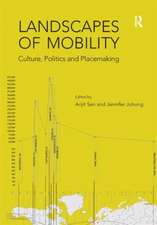Tropical Sustainable Architecture
Editat de Joo Hwa Bay, Boon Lay Ongen Limba Engleză Paperback – 12 iul 2006
Many local and overseas architects, planners and city fathers are interested in the social and environmental dimensions of these areas that contribute towards short terms solutions and long term sustainable developments. This book, developed from the first conference of the International Network for Tropical Architecture, supplies a wealth of information from experts worldwide covering the cultural, environmental and technical aspects of thinking, researching and designing for the tropics.
| Toate formatele și edițiile | Preț | Express |
|---|---|---|
| Paperback (1) | 465.26 lei 6-8 săpt. | |
| Taylor & Francis – 12 iul 2006 | 465.26 lei 6-8 săpt. | |
| Hardback (1) | 1000.27 lei 6-8 săpt. | |
| Taylor & Francis – 26 noi 2015 | 1000.27 lei 6-8 săpt. |
Preț: 465.26 lei
Preț vechi: 547.35 lei
-15% Nou
Puncte Express: 698
Preț estimativ în valută:
89.03€ • 93.20$ • 73.66£
89.03€ • 93.20$ • 73.66£
Carte tipărită la comandă
Livrare economică 05-19 aprilie
Preluare comenzi: 021 569.72.76
Specificații
ISBN-13: 9780750667975
ISBN-10: 0750667974
Pagini: 310
Ilustrații: Approx. 100 illustrations (50 in full color)
Dimensiuni: 189 x 246 x 13 mm
Greutate: 0.57 kg
Ediția:1
Editura: Taylor & Francis
Colecția Routledge
Locul publicării:Oxford, United Kingdom
ISBN-10: 0750667974
Pagini: 310
Ilustrații: Approx. 100 illustrations (50 in full color)
Dimensiuni: 189 x 246 x 13 mm
Greutate: 0.57 kg
Ediția:1
Editura: Taylor & Francis
Colecția Routledge
Locul publicării:Oxford, United Kingdom
Public țintă
Professional Practice & DevelopmentCuprins
Sustainable Social Quality; The Selective Environment: Environmental Design and Cultural Identity; The Ecological Design of Large Buildings and Sites in the Tropics; High-rise High-Density Living; Socio-Environmental Dimensions: In Tropical Semi-open Spaces of High-rise Housing in Singapore;Building Environmental Assessment Methods from Sustainable Architecture Perspective: An Analysis in Singapore Public Housing Context; Building and Planning Requirements; Policy and Evaluation System for Green Building in Subtropical Taiwan; In Search of a Habitable Urban Space-Built Ratio: A Case Study of Building and Planning Regulation in Dhaka City; Urban Environmental Impacts; Designing High Density Cities – Parametric Studies of Urban Morphologies and Their Implied Environmental Performance;Exploring the Urban Heat Island Effect in Singapore;Thermal Environment Study of Urban Canyons; Experimental Sustainable Projects; Tropical and Traditional: Inventing a New Housing Model for the Old 36 Street Quarter in Hanoi, Vietnam; ECOPET 21: An Innovative Sustainable Building System for Ecological Communities in Tropical Regions; Critique on Tropical Architecture; Is Sustainability Sustainable? Interrogating the Tropical Paradigm in Asian Architecture
Recenzii
"An essential source of inspiration"
Building Engineer, December 2006
Building Engineer, December 2006
Descriere
The tropical belt – where large areas of South East Asia, India, Africa and parts of both North and South America are located – forms the biggest landmass in the world and has one of the highest numbers of rapidly developing cities. Coincidentally, architecture in these regions shares common problems, the most easily identifiable being the tropical conditions of climate and natural environment. The context for architecture here is fraught with conflicts between tradition and modernization, massive influx of rural poor into urban areas, poorly managed rapid urban development as well as the cultural and social strain of globalization.
Many local and overseas architects, planners and city fathers are interested in the social and environmental dimensions of these areas that contribute towards short terms solutions and long term sustainable developments. This book, developed from the first conference of the International Network for Tropical Architecture, supplies a wealth of information from experts worldwide covering the cultural, environmental and technical aspects of thinking, researching and designing for the tropics.
Many local and overseas architects, planners and city fathers are interested in the social and environmental dimensions of these areas that contribute towards short terms solutions and long term sustainable developments. This book, developed from the first conference of the International Network for Tropical Architecture, supplies a wealth of information from experts worldwide covering the cultural, environmental and technical aspects of thinking, researching and designing for the tropics.
















